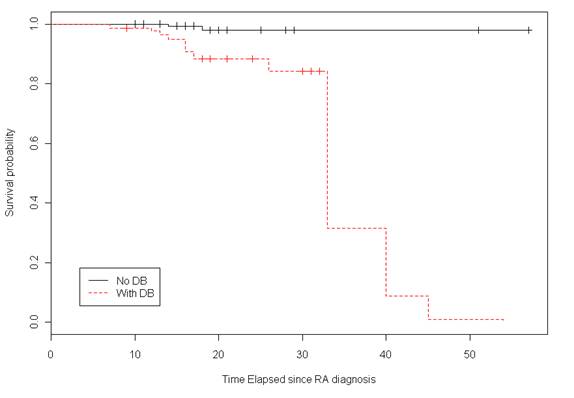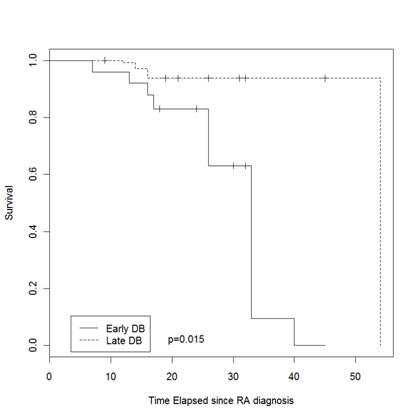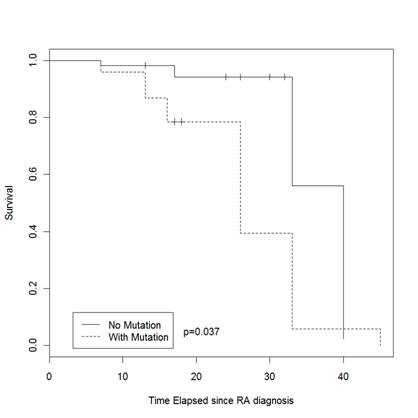Session Information
Title: Rheumatoid Arthritis - Clinical Aspects II: Clinical Features & Comorbidity/Cardiovascular Disease
Session Type: Abstract Submissions (ACR)
Background/Purpose: In cystic fibrosis, mutations of the cystic fibrosis transmembrane conductance regulator (CFTR) gene lead to diffuse bronchiectasis (DB) and decreased survival. DB is also associated with rheumatoid arthritis (RA), in which the role of CFTR mutations in predisposition to DB has been established (Puéchal et al. ARD 2011,70:653-9). The prognosis of RA-associated DB (RA-DB) has not been well described.
Methods: We report on long-term mortality in a French nationwide prospectively followed, well-characterized, family-based association study of patients with a diagnosis of RA, DB or RA-DB. Families of probands with RA-DB were included if one first-degree relative had RA and/or DB. We assessed the overall mortality according to clinical characteristics and CFTR mutations among 138 subjects from 24 kindreds enrolled in the cohort. The association of potential risk factors with death was tested by Cox proportional-hazard analysis.
Results: During a median follow-up time after the inclusion of 10.6 years, 18 patients in the study cohort died, mainly due to respiratory involvement. The survival of RA-DB patients was significantly lower than the one of the RA patients and DB patients (P=0.006) (Fig A). In RA patients, the presence of DB was the main poor prognostic factor (hazard ratio for death, 8.7; 95% CI, 1.6 to 48.5; P=0.01). Among the RA-DB patients, an early onset of DB (hazard ratio, 18.6; 95% CI, 2.2 to 156.9; P<0.01) and CFTR mutation (hazard ratio, 8.3; 95% CI, 1.5 to 45.7; P=0.02) had an independent, significant association with decreased survival (Fig B and C). A CFTR mutation in RA patients with early-onset DB defined a subgroup of patients with increased mortality (hazard ratio, 9.4; 95% CI, 2.5 to 35.0; P<0.001).
Figure A. Survival curves in RA patients using Cox proportional Hazard model and two strata (with and without DB) (p=0.006).
Figure B. Cox survival curves in RA patients with DB according to age of DB onset.
Figure C. Cox survival curves in RA patients with DB according to CFTR mutational status.
Conclusion: In this prospective family cohort, DB in RA patients was associated with decreased overall survival. CFTR mutation in early-onset DB was strongly associated with shortened survival in RA patients and provides a new biomarker for risk stratification and design of future therapeutic interventions.
Disclosure:
X. Puéchal,
None;
E. Génin,
None;
T. Bienvenu,
None;
D. J. Dusser,
None.
« Back to 2012 ACR/ARHP Annual Meeting
ACR Meeting Abstracts - https://acrabstracts.org/abstract/decreased-survival-in-rheumatoid-arthritis-complicated-with-bronchiectasis-a-family-based-cohort-study/



